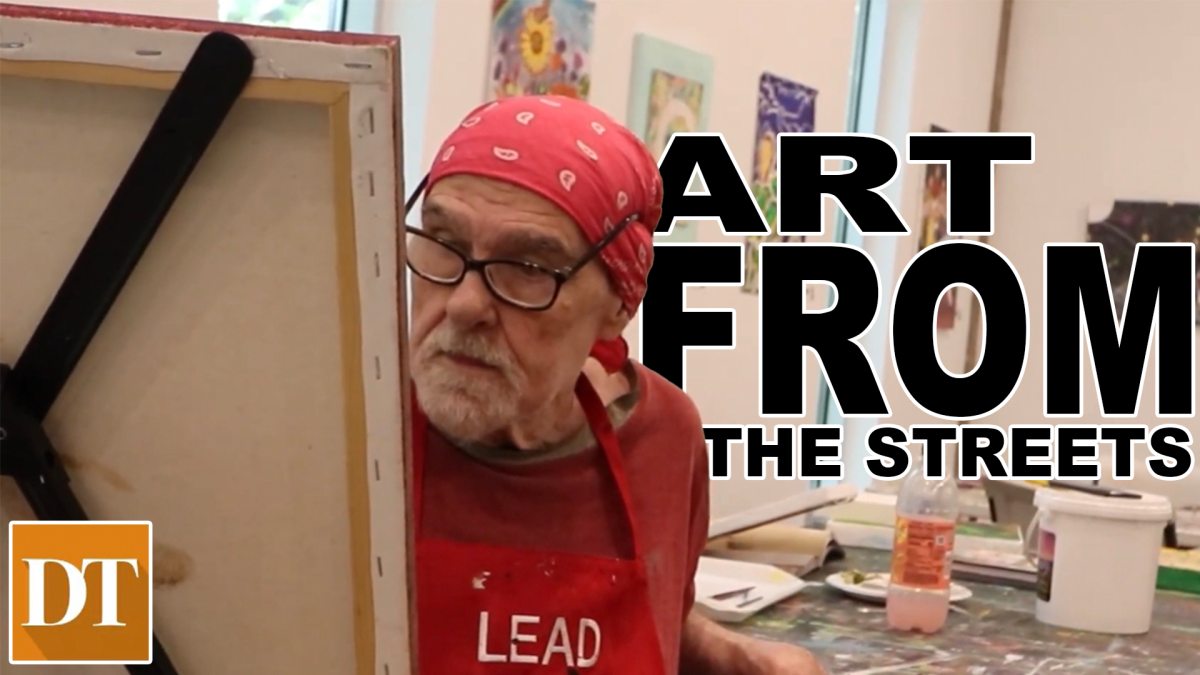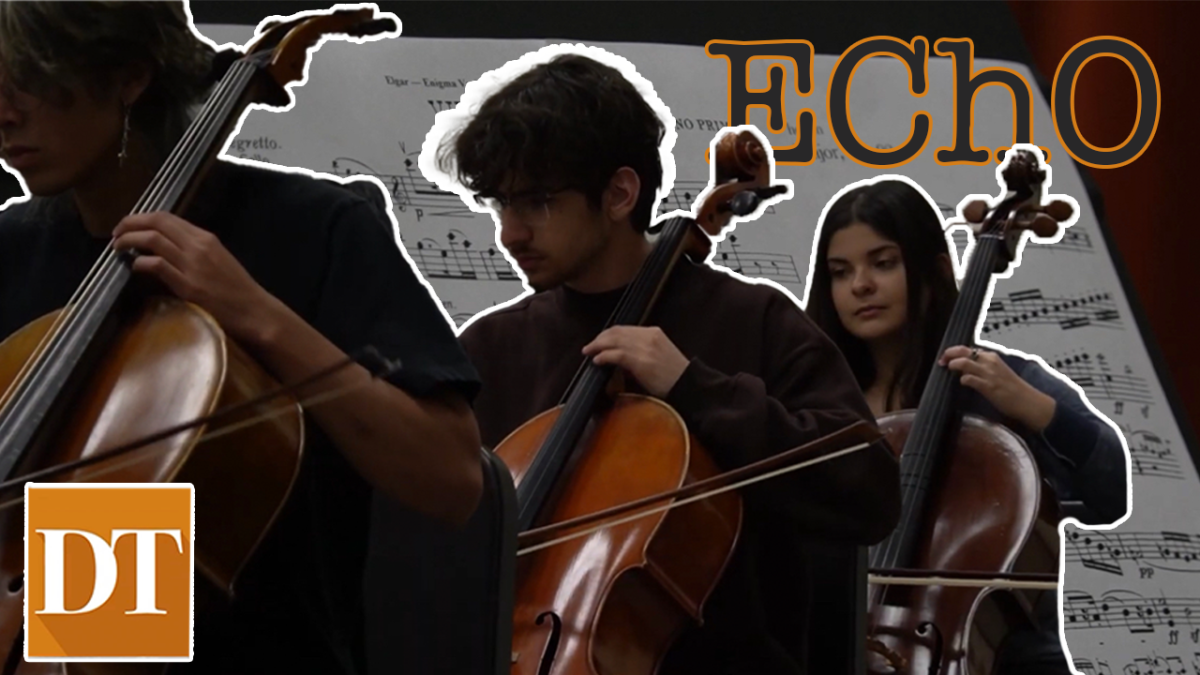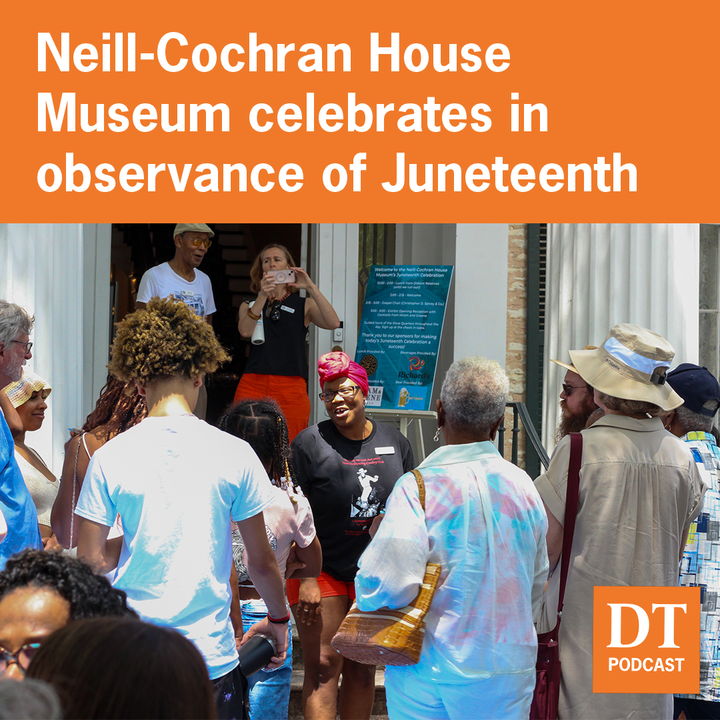In this People of UT episode, Audio Producer Jake Gripp talks to Tom Palaima — a UT professor with a passion for Bob Dylan’s music. He teaches the signature course Bob Dylan and the Social-Historical Imagination, or as Palaima likes to put it, Dylanology.
Reported and produced by Jake Gripp. Cover shot by Manoo Sirivelu and designed by Carla Garcia Leija.
*upbeat music*
Jake Gripp: Welcome to People of UT, the show that introduces you to members of the UT community that have made a positive impact, big or small, on other community members. I’m your host for this episode, Jake Gripp.
Jake: There is a room…
*door opening*
Jake: Tucked away in the Corner of Waggener Hall on UT’s Campus. It’s lined with cardboard boxes and books about the ancient Aegean and the Homeric Bronze Age, surrounded by art pieces depicting ancient scripts… and is home to professor Tom Palaima.
Jake: The Indiana Jones vibe of Palaima’s office is no joke, he teaches a wide variety of classes here at UT from Greek languages to war & violence studies… but he teaches one class in particular that simply can’t be compared to the rest…
Thomas Palaima: Bob Dylan History Imagination
*folk music*
Jake: You heard that right, Palaima Teaches a class called Bob Dylan and the Social-Historical Imagination, a signature course here at UT that puts Dylan’s songs into their social and historical context, or as he puts it…
Thomas Palaima: It’s a way of looking at an absolute genius. He’s a late 20th century, into the 21st century Mozart, in terms of his musical abilities and his creative abilities in the realm of music.
Jake: When asked about the origins of the course he admits that he wasn’t the first one to teach Dylan…
Thomas Palaima: to give credit where credit is due. The first person who taught a real, uh, and a great Dylan class on campus was Brian Doherty in the English department.
Jake: But when Doherty had to step away, they needed a replacement, and there was only one man for the job…
Thomas Palaima: So Brian knew of me, but he had the guts to create a course in the summer. And I sat in on it, and he had me do a couple guest lectures in it. And I thought, wow, this is really good, but man, that’s a lot of work, and he’s really done, he’s doing it already, you know. But then the second summer, he had, I believe it was prostate cancer.He needed to have a serious operation, a week in to the class. Well, who else on campus can do the rest of the class? Well, I’d already sat in on a lot of it. And I was a known Dylan guy, so I then, his class, sticking pretty much to what Brian had laid out. But as I went, I said, I would do this this way. And I’m not as literary as, as Brian is. You know, I don’t have the rich command of contemporary literature that he does. So what, how would I want to approach it? I know, I’d approach it from, Where is Dylan’s place in, uh, as a communicator of the human experience, and therefore naturally developed out of that.
*transition music*
Jake: Palaima’s class is more than just an analysis of music, it includes poetry and literature, the vast cultural combinations present in this music and… most importantly it also portrays Dylan’s music as, in some sense, having answers…
Thomas Palaima: Has understood the human concerns that are embedded in all that music. There’s no better way to essentially figure out what it is to be an American in the year 2024 than to listen to Bob Dylan’s music and to discuss it.
Jake: He even says his music could aid in your own problems…
Thomas Palaima: You know, if you’re, if you’re paying money on a therapist, hell just put on blood on the tracks. If you’re having prob or romantic problems, put on blood on the tracks and man, you’ll be, you’ll have questions to, to ponder and try to answer for the rest of your life, you know?
Thomas Palaima: Dylan addresses even when he’s not intending to, you know, aspects of the human experience that always cause you to take a pause and think about it in a different way you know.
Jake: But what’s Palaima’s Bob Dylan origin story?
Thomas Palaima: I have a brother who’s five years older than I am, who was really hip, you know. When I was in, I was born in 51, and in 1963 I was 12 years old, but my brother was 17. And he would come back, you know, with Frank Zappa, with the Thugs, you know, and I’d get to listen to all this stuff.
But he brought, in 64, he brought Bob Dylan’s Bringing It All Back Home, you know… and I listened to it and it just, I just said, wow, and I had a friend named Eric who listened to it too. And that music sort of opened up my whole thought process. It just, you know, made my mind expand. And I became hooked very, very quickly.
Jake: Ever since then, Dylan has remained a constant in his life
Thomas Palaima: Dylan, uh, addresses. Uh, even when he’s not intending to, you know, aspects of the human experience that always cause you to take a pause and think about it in a different way.
*Folk Music*
Jake: Although Palaima has so much to say and is so passionate about Dylan he hasn’t met the man himself
Thomas Palaima: Meeting Bob Dylan, you probably have a greater chance of, I don’t know, I can’t even think of a comparison. No, Dylan values his privacy especially, especially because of what happened to him in the 60s when, you know, he went up the Woodstock and tried to live a life with, uh, With children and a, and a wife and, and people were literally crawling on his roof, banging on his windows at night, wanting to him to solve the prob their own problems or the problems of the universe.
Jake: Palaima originally said that he didn’t know what he wanted to ask Dylan if ever given the chance. But he revealed he had a question that had been with him for a while
Thomas Palaima: And so I wanted to ask him, you crossed the United States in January of 1961, in the middle of a snowstorm, you came to New York City, and either that day or the very next day you went out to see Woody Guthrie, who was then, seven years, enforced middle of a snowstorm, you came to New York City, and either that day or the very next day you went out to see Woody Guthrie, who was then, seven years, enforced the inside a mental health institute for his Huntington’s Chorea, a debilitating nerve disorder. What did it do to you to see this person whom you had used as an inspiration who had these magnificent songs, who was a conspicuous presence in American culture, to see the state he was in?
Jake: But after further consideration, as it turns out, he wouldn’t ask Dylan anything at all, just give him a very important message… a message of gratitude
Thomas Palaima: Now if I had the opportunity to, I wouldn’t ask him that question. It’s just far too personal and what’s, what are you going to say to something like that? So I think what I would say… Thank you for letting me be in your presence, and thank you for letting me thank you for the richness you’ve added to my own life, and to the life of my students.
Jake: Palaima is openly passionate about Dylan and how his music can apply to the life of the average person in meaningful ways. He also had a passion for sharing this passion… A passion about Bob Dylan and the human experience…
Thomas Palaima: I think he, more than anything else, I think he has a reverence for human life. You know, in other words, he… reverence is somehow connected. We use the word reverence when we’re thinking about the awe that we feel in front of something, right? And, or we want to add a really significant title to reverend, you know, to somebody who’s a man of God or a woman of God. So I think that’s the other last thing I would like to stress that we didn’t stress before. That he has a reverence about the human condition that takes in everything. Takes in everything. And that’s not, I’m not exaggerating. It’s hard to find some aspect of the human existence that he hasn’t touched upon. And if you told him that he missed it, he’d probably write another song about it, you know
*Outro Music*
Jake: People of UT is a production of The Daily Texan Audio Department. If you liked this episode, make sure you subscribe to The Daily Texan Podcasts on your streaming platform of choice and follow us on Twitter @texanaudio. This episode was reported and edited by me, Jake Gripp.









